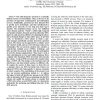Free Online Productivity Tools
i2Speak
i2Symbol
i2OCR
iTex2Img
iWeb2Print
iWeb2Shot
i2Type
iPdf2Split
iPdf2Merge
i2Bopomofo
i2Arabic
i2Style
i2Image
i2PDF
iLatex2Rtf
Sci2ools
MONET
2006
2006
Market Driven Dynamic Spectrum Allocation over Space and Time among Radio-Access Networks: DVB-T and B3G CDMA with Heterogeneous
The radio frequency spectrum is a naturally limited resource of extraordinary value, as the key to the provision of important communication and information services. Traditionally, spectrum has been allocated first to specific access technologies, and then sub-allocated to specific access networks, on very long term basis (up to decades). The traditional scheme can be very inefficient when demand patterns ("loads") exhibit high temporal and spatial variations. Dynamic spectrum allocation (DSA) improves radio spectrum efficiency by adjusting the allocation as demand changes in time and/or space. In previous work, we introduced a DSA scheme in which a spectrum manager periodically auctions short-term spectrum licenses. The scheme can be supported by a realistic "pooling" business model, and can work with many radio-access technologies. But our previous analysis only considers a code-division multiple access (CDMA) technology; and DSA provides the greatest benefits wit...
| Added | 14 Dec 2010 |
| Updated | 14 Dec 2010 |
| Type | Journal |
| Year | 2006 |
| Where | MONET |
| Authors | Virgilio Rodriguez, Klaus Moessner, Rahim Tafazolli |
Comments (0)

